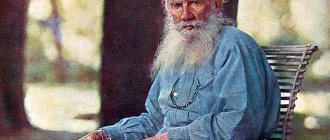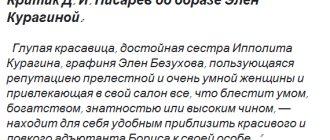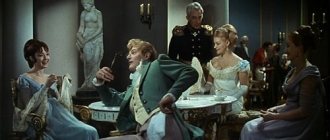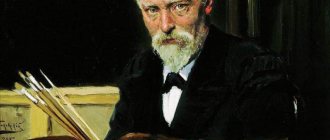Meeting with Pierre and Natasha
1Bolkonsky
The reader first meets this hero in St. Petersburg in the living room of Anna Pavlovna Sherer with her pregnant wife Lisa. After the dinner party, he goes to his father in the village. He leaves his wife there in the care of his father and younger sister Marya. Sent to the war of 1805 against Napoleon as Kutuzov's adjutant. Participates in the Battle of Austerlitz, in which he was wounded in the head. Upon arriving home, Andrei finds his wife Lisa giving birth.
Having given birth to her son Nikolenka, Lisa dies. Prince Andrei blames himself for being cold with his wife and not paying her due attention. After a long depression, Bolkonsky falls in love with Natasha Rostova. He offers her his hand and heart, but at the insistence of his father postpones their marriage for a year and leaves abroad. Shortly before his return, Prince Andrei receives a letter of refusal from his bride. The reason for the refusal is Natasha’s affair with Anatoly Kuragin. This turn of events becomes a heavy blow for Bolkonsky. He dreams of challenging Kuragin to a duel. To drown out the pain of disappointment in the woman he loves, Prince Andrei devotes himself entirely to service.
Participates in the War of 1812 against Napoleon. During the Battle of Borodino he received a shrapnel wound in the stomach. While moving, the wounded man accidentally meets the Rostov family, and they take charge of him. Natasha, never ceasing to blame herself for cheating on her fiance and realizing that she still loves him, asks for forgiveness from Andrei, in the Rostovs’ house
Dreams and ideals
Looking for his Toulon; wants national fame and recognition; his idol is Napoleon.
To achieve my goal I am ready to sacrifice
“...Father, wife, sister are the most dear people to me... I will give them all now for a moment of glory, triumph over people.” “Death, wounds, loss of family, I’m not afraid of anything.”
Appearance
“Prince Bolkonsky was small in stature, a very handsome young man with definite and dry features”
The best moments of life
What changes in the hero
Sky near Austerlitz
He begins to understand the insignificance of Napoleon’s “petty vanity” in comparison with that “high, fair and kind sky that he saw and understood.”
The prince realized the great truth - life is an absolute value. I felt my connection with infinity: “Nothing is true except the insignificance of everything that is clear to me, and the greatness of something incomprehensible, but most important.”
Discovering the wealth of peaceful life
Returning from French captivity, Bolkonsky learns about the death of his wife. The “dead, reproachful face” of the little princess will forever remain in his memory. From this moment on, Prince Andrei will be tormented by thoughts of the neglect with which he treated his wife, he will understand and realize the value of family happiness, the joy of everyday life among family members: father, sister, son Nikolenka.
The prince repents of his ambitious dreams, the natural needs of love and goodness rise in his soul.
Meeting with Pierre in Bogucharovo
“The meeting with Pierre was for Prince Andrei the era from which, although in appearance the same, but in the inner world, his new life began.” Pierre “infects” Prince Andrei with his faith in people, in life not only earthly, but also eternal, in God.
Prince Andrei accepts some of Pierre's beliefs, which have a beneficial effect on Bolkonsky. Now the prince can admit to himself: “How happy and calm I would be if I could now say: “Lord, have mercy on me.”
Meeting with Natasha Rostova in Otradnoye
He returns to “living life” and begins to feel the joy of communicating with the big world and people. In this state, Prince Andrei hurries to enter the spheres of state activity close to him and converges with Speransky.
Natasha's emotionality, her sincerity and delight give impetus to the prince's spiritual rebirth.
Love for Natasha Rostova
He changes his attitude towards Speransky, whom he has already begun to reverence as an idol, and notices in himself a disdain for the business in which he had previously been so interested: “Can this make me happier and better?”
The prince becomes happier and better from the feeling that Natasha Rostova awakens in his soul
Participation in the War of 1812 In the army, the prince becomes a caring and attentive commander. He refuses the offer to serve in the army headquarters; he is not concerned about dreams of personal glory. The soldiers call him “our prince.”
During the Battle of Borodino, Bolkonsky fulfills his duty; he is driven not by a desire for personal glory, but by a sense of honor as an officer, hatred of the enemy who devastated his native land, his Bald Mountains.
Forgiveness of Anatoly Kuragin Having seen how Anatoly Kuragin’s leg was amputated, the prince experienced sincere sympathy for the pain and suffering of this man: “The flower of love blossomed in the spring, free, independent of this life...”
Revival of love for Natasha Rostova After a serious injury, she experiences a passionate desire to live. It is at these moments that his love for Natasha Rostova returns to him. But this is a different feeling: “... for the first time he imagined her soul. For the first time I understood the cruelty of breaking up with her.”
Death of Andrei Bolkonsky
“The more he, in those hours of suffering solitude and semi-delirium that he spent after his wound, thought about the new, open beginning of eternal love, the more he, without feeling it himself, renounced earthly life. To love everyone, to always sacrifice oneself for love, meant not loving anyone, it meant not living this earthly life.”
The fate of Andrei Bolkonsky is the path of a man who makes mistakes and is able to atone for his guilt, striving for moral perfection. Initiation of the feeling of eternal love revived the strength of spirit in Prince Andrei, and he accomplished the most difficult thing, according to Tolstoy, - he died calmly and with dignity. And death became the “moment of truth” of his life.
Stages in the development of the personality of Andrei Bolkonsky
Battle of Austerlitz
Prince Andrei’s participation in the war of 1805 is connected with his ambitious dreams of glory, of his “Toulon”. A passion for Napoleon was characteristic of many representatives of the advanced noble youth of the early 19th century. But Andrei thirsted not only for personal glory, but also for happiness for people. Tolstoy singles him out from the crowd of staff careerists (such as Zherkov and Drubetskoy). Overcoming the “Napoleonic” beginning, the desire to become higher than the people around him, ends this stage in Andrei’s life. The sky of Austerlitz helped Prince Andrey understand that both his admiration for Napoleon and his dream of becoming the savior of the Russian army were just a delusion.
Meeting with Pierre and Natasha
Disappointed in his former ideals, having experienced the grief of loss and repentance, Prince Andrei is confident that he has understood what happiness lies in: the absence of illness and remorse. But Pierre (in an argument on the ferry) proves to him that one must believe in the goodness and high destiny of man. And the meeting with Natasha saves Prince Andrei from a spiritual crisis, awakens in him love and the desire to live.
battle of Borodino
In the Patriotic War of 1812, the fate of the prince merged for the first time with the fate of the people. He returns to the army, overcome by the same feeling of offended national pride that leads ordinary Russian soldiers into battle. In the Battle of Borodino (unlike the Battle of Austerlitz), the prince accomplishes a real moral feat, achieves harmony with himself and understands that the main purpose of man is to serve the interests of his native people.
Prince Andrei dies from a wound received on the Borodino field. Tolstoy reconciles him not only with Natasha, but with the entire world, including the wounded Anatoly Kuragin. The writer put into the image of Prince Andrei his cherished thought that life is governed only by love and kindness, and without them neither true perfection nor deliverance from torment and contradictions is possible.
1
Prince Andrei disputes Pierre's idea about the need to bring good to people, but he questions what serves as its basis - the eternal life of God - but does not deny it. The existence of God, of course, cannot be proven, but therefore it cannot be refuted. Prince Andrei doubts, but he thirsts, passionately wants there to be God and eternal life. And this thirst, awakened by Pierre, becomes a life-changing force for Bolkonsky, transforming him.
The world responds to the call of the human soul and confirms the reality of its deepest aspirations. It is remarkable that for the first time in many days Prince Andrei saw what had always been above his head - the high eternal sky.
The meeting with Pierre was an epoch for Prince Andrei, with
which began, although in appearance it is the same, but
in the inner world there is his new life.
After a trip to his Ryazan estates, “Prince Andrei decided to go to St. Petersburg and came up with various reasons for this decision. A whole series of reasonable logical arguments why he needs to go to St. Petersburg and even serve every minute was ready for his services.” At first I decided to go, and then I came up with reasons. This decision matured in the hero’s soul for a year: that’s exactly how long passed after Prince Andrei’s conversation with Pierre on the ferry.
During this time, Prince Andrei did a lot. He carried out “all those enterprises on the estates that Pierre started and did not bring to any result.” But note that the author reports on Bolkonsky’s reforms casually, devoting only a few lines to them. But he talks in detail about Prince Andrei’s trip to Otradnoye, the Rostovs’ estate. Here the hero develops a new understanding of life.
In Otradnoye, Prince Andrei meets Natasha Rostova for the first time. He, sad and preoccupied, drove up to the Rostovs’ house.
To the right, from behind the trees, he heard a woman cheerfully
scream and saw a crowd of girls running. Ahead
the running girl shouted something, but recognizing the stranger,
Without looking at him, she ran back. Prince Andrey
suddenly something started to hurt.
It hurt him because “this thin and pretty girl did not know and did not want to know about his existence.” The feeling experienced by Prince Andrei at the sight of Natasha is an event. Prince Andrei stays overnight with the Rostovs, his room turns out to be under the rooms of Natasha and Sonya and he unwittingly overhears their conversation. And again he becomes annoyed. He wants them to say something about him. The next day, returning to Bogucharovo and driving through the forest, Prince Andrei is looking for that old oak tree, which “alone did not want to submit to the charm of spring and did not want to see either spring or the sun.” This oak, then, seemed to confirm the correctness of the hopeless view of the life of Prince Andrei.
But now he is looking and does not find his old acquaintance. And by that time the old oak, completely transformed, spread out like a tent of lush dark greenery, was thrilled, slightly swaying in the rays of the evening sun. And here comes the final and irrevocable decision of Prince Andrei to return to active life. It was caused directly by an unreasonable spring feeling of joy by natural forces akin to those that transformed an old tree. But nevertheless, it appeared as the final link in the chain of events that were immediately revealed to Prince Andrei in their clear and undoubted connection. “All the best moments of his life suddenly came back to him at the same time.” The best moments are not necessarily the happiest. The best are the most significant, most important moments in the hero’s life.
In St. Petersburg, Prince Andrei took an active part in the preparation of reforms. He was disillusioned with fame, but still believed in the existence of people on whom the fate of countries and peoples depended. He was irresistibly drawn to the higher spheres, where the future was being prepared, on which the fate of millions depended. He watched with curiosity the movements of Spiransky, his new idol. Gradually Bolkonsky frees himself from his illusion. If he abandoned the desire for fame, having become convinced of its “unfaithfulness,” then his cooling towards politics occurs due to a strong feeling that gave Prince Andrei the experience of true life.
Here the final word belongs to Natasha Rostova, whose love destroyed the charm of power and interest in politics in Bolkonsky’s eyes. His disappointment occurs the day after the ball, where he danced with Natasha, who enchanted him. Prince Andrei did not attach much importance to the last ball.
Tolstoy obviously emphasizes the everyday nature of the hero’s state, who has not yet realized the full importance of what happened. Natasha's charm and influence begin to affect the fate of Prince Andrei. The hero has a new view of the world that changes everything: what seemed to be the most important meaning of life is depreciated. Love for Natasha shows and gives Prince Andrei a new measure of what is true in life. Before the hero’s new feeling, his life, the meaning of which was the political interests of transformation, fades. And Pierre, influenced by Prince Andrei’s feelings for Natasha, became disillusioned with his life. “And this former life suddenly presented itself to Pierre with unexpected abomination.” Everything in which he found satisfaction and joy suddenly lost all meaning in his eyes.
Pages: 5
Related materials:
Lexical and stylistic means of expression. Lexical repetition Sound (rhyme, stanza, foot, elements of sound recording) and word-formation (repetition of words of the same word-formation model, words with the same root, etc.) - these types of language repetition have a strong emotional impact on...
Literary fairy tale as a genre Fairy tale is one of the main genres of oral folk art. This is an artistic narrative of a fantastic, adventure or everyday nature. Many writers and poets followed the principles of folk tales, where the colors coexist...
N. Gogol At the name of Pushkin, the thought of a Russian national poet immediately dawns. In fact, none of our poets is higher than him and can no longer be called national; this right is decisively his. It, as if in a lexicon, contained...






